Solve the problem of deleting spaces in excel cells in five minutes
This article brings you relevant knowledge about excel, which mainly introduces the related issues of deleting cell spaces and deleting spaces in cells. This question seems simple, but it is actually a bit complicated. It can be roughly divided into four types of small problems. Let’s take a look at them together. I hope it will be helpful to everyone.
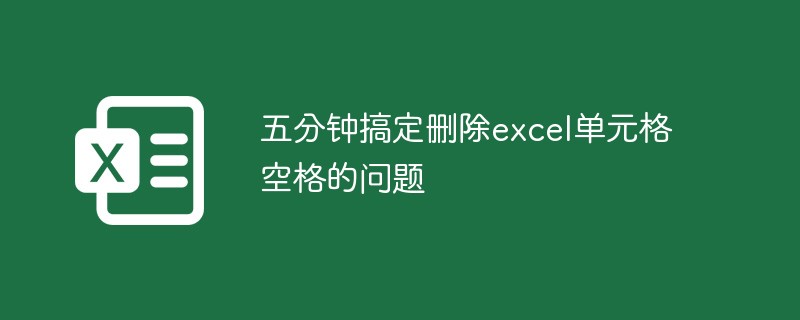
Related learning recommendations: excel tutorial
Today I will talk to you about a common problem in the process of data cleaning and organization: deletion Spaces in cells. This question seems simple, but it is actually a bit complicated. It can be roughly divided into four types of small problems. Next, we will talk about them one by one from the shallower to the deeper.
1. Serious space deletion
Let’s talk about the first and simplest situation first.
As shown in the figure below, A:B is the data source, column A is the name of the person, and column B is the score. Because there are a lot of spaces before and after the name in column A, the VLOOKUP function in column E returns an error value.
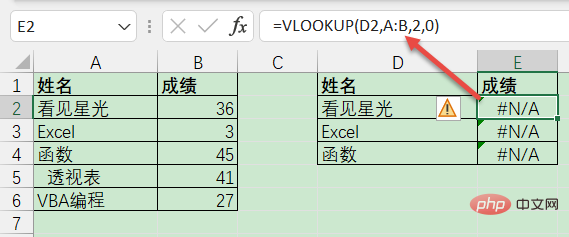
In this case, just find and replace directly and replace the spaces with blanks.
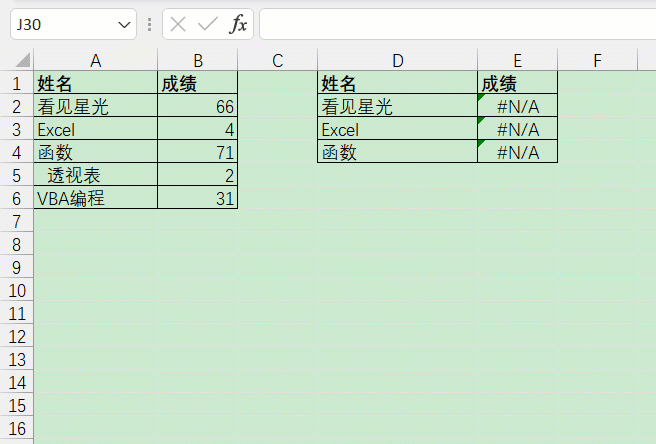
It should be noted that the space here is best copied from the cell rather than entered manually. You will learn later that there are dozens or hundreds of styles of spaces, and the space key is just one of the common ones~
2. Say one of the spaces in the ID card
In special cases, delete the spaces in the ID card.
As shown in the figure below, there are spaces in the ID number in column A and need to be deleted.
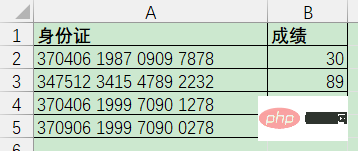
The first reaction of some friends is to find and replace, but because the ID card is a long text, it will be converted into a numerical value after replacement, and the maximum length of the numerical value effectively saved in the cell is 15 digits, which results in the last three digits of the 18-digit ID card being converted to 0.
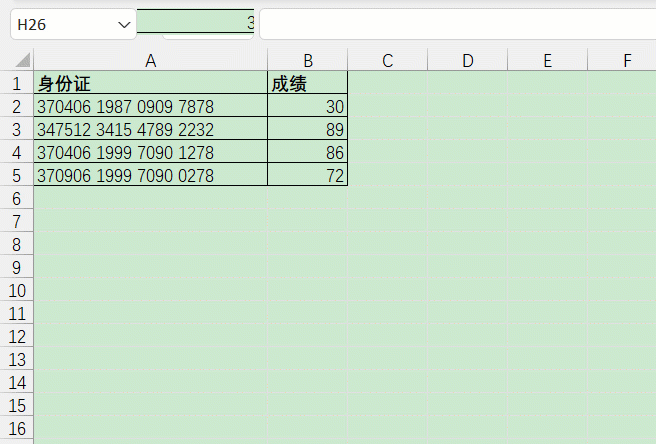
There are two commonly used solution methods, one is the SUBSTITUTE function, The result returned by the text function must be text, so it will not cause the ID number to be deformed:
=SUBSTITUTE(A2,” “,””)
The other one is search and replace, but it adds a little foreplay and uses the format brush to force the cells to be converted to text format.

3. Remove leading and trailing spaces
Sometimes we don’t need to delete all the spaces in the data, but need to delete all the leading and trailing spaces, the middle One consecutive space is reserved, and Excel provides a special function for this: TRIM.
As shown in the figure below, the data in column A contains a large number of spaces and needs to be converted to the style of column B.

Enter the following formula in cell B2:
=TRIM(A2)
4. Delete the spaces exported by the system
As we said above, There are hundreds of different types of spaces, and the space key is just one of the common ones.
You enter the formula in cell A2:
=UNICHAR(ROW(A1))
Fill it into the area A1:A10000, and you can see a variety of character graphics, including cows, sheep, airplanes, and cannons. Ships, burgers, etc., there are also various visible and invisible spaces.
You can get whatever you need for aircraft and cannons.
If you have time, you can also use these graphics to draw...
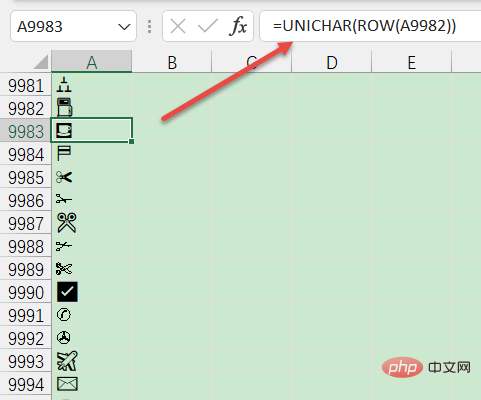
Export from the system The data sometimes contains spaces that are not generated by the formal space key.
For this kind, if it is visible, you can copy one from it and then find and replace.
If the search and replace fails, you can use the TRIM CLEAN function combination:
=CLEAN(TRIM(A1))
CLEAN, which means cleaning in English, can clean up some invisible spaces.
But whether it is search and replace or the CLEAN function, they are functions developed by Excel in recent times, which means that they cannot solve many new generation spaces.
For example, the famous zero-width blank 8203. 8203 is its UNICODE encoding. If your Excel version is 2019 and above, you can use UNICHAR (8203) to return this character.
Zero-width blank 8203 is like a ghost, completely invisible. Not only is it invisible in Excel, but it is also invisible when data is copied to WordPad, Word and other software. However, if it does exist, it will still cause VLOOKUP. Conditional queries or statistical functions cannot be calculated correctly.
As shown in the figure below, using the LEN function, you can find that the length of the string returned by the function is completely different from what you can see with the naked eye, but you cannot find any redundant words in the edit column.
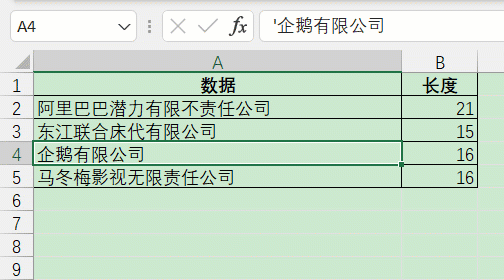
对于这种情况,由于不可见字符通常出现在数据的首尾,可以使用LEFT函数查找首个字符是否返回空白。
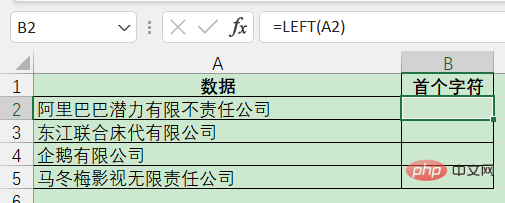
如果LEFT函数返回结果为空白,则使用SUBSTITUTE函数将它替换即可。
=SUBSTITUTE(A2,LEFT($A$2),””)

同理,如果空格在尾部,可以使用RIGHT函数:
=SUBSTITUTE(A2,RIGHT($A$2),””)
或者管它是头是尾是左是右是男是女,二元对立多烦啊?统统一刀切了!
代码看不全可以左右拖动..
=SUBSTITUTE(SUBSTITUTE(A2,RIGHT($A$2),””),LEFT($A$2),””)
相关学习推荐:excel教程
The above is the detailed content of Solve the problem of deleting spaces in excel cells in five minutes. For more information, please follow other related articles on the PHP Chinese website!

Hot AI Tools

Undresser.AI Undress
AI-powered app for creating realistic nude photos

AI Clothes Remover
Online AI tool for removing clothes from photos.

Undress AI Tool
Undress images for free

Clothoff.io
AI clothes remover

Video Face Swap
Swap faces in any video effortlessly with our completely free AI face swap tool!

Hot Article

Hot Tools

Notepad++7.3.1
Easy-to-use and free code editor

SublimeText3 Chinese version
Chinese version, very easy to use

Zend Studio 13.0.1
Powerful PHP integrated development environment

Dreamweaver CS6
Visual web development tools

SublimeText3 Mac version
God-level code editing software (SublimeText3)

Hot Topics
 1389
1389
 52
52
 What should I do if the frame line disappears when printing in Excel?
Mar 21, 2024 am 09:50 AM
What should I do if the frame line disappears when printing in Excel?
Mar 21, 2024 am 09:50 AM
If when opening a file that needs to be printed, we will find that the table frame line has disappeared for some reason in the print preview. When encountering such a situation, we must deal with it in time. If this also appears in your print file If you have questions like this, then join the editor to learn the following course: What should I do if the frame line disappears when printing a table in Excel? 1. Open a file that needs to be printed, as shown in the figure below. 2. Select all required content areas, as shown in the figure below. 3. Right-click the mouse and select the "Format Cells" option, as shown in the figure below. 4. Click the “Border” option at the top of the window, as shown in the figure below. 5. Select the thin solid line pattern in the line style on the left, as shown in the figure below. 6. Select "Outer Border"
 How to filter more than 3 keywords at the same time in excel
Mar 21, 2024 pm 03:16 PM
How to filter more than 3 keywords at the same time in excel
Mar 21, 2024 pm 03:16 PM
Excel is often used to process data in daily office work, and it is often necessary to use the "filter" function. When we choose to perform "filtering" in Excel, we can only filter up to two conditions for the same column. So, do you know how to filter more than 3 keywords at the same time in Excel? Next, let me demonstrate it to you. The first method is to gradually add the conditions to the filter. If you want to filter out three qualifying details at the same time, you first need to filter out one of them step by step. At the beginning, you can first filter out employees with the surname "Wang" based on the conditions. Then click [OK], and then check [Add current selection to filter] in the filter results. The steps are as follows. Similarly, perform filtering separately again
 How to change excel table compatibility mode to normal mode
Mar 20, 2024 pm 08:01 PM
How to change excel table compatibility mode to normal mode
Mar 20, 2024 pm 08:01 PM
In our daily work and study, we copy Excel files from others, open them to add content or re-edit them, and then save them. Sometimes a compatibility check dialog box will appear, which is very troublesome. I don’t know Excel software. , can it be changed to normal mode? So below, the editor will bring you detailed steps to solve this problem, let us learn together. Finally, be sure to remember to save it. 1. Open a worksheet and display an additional compatibility mode in the name of the worksheet, as shown in the figure. 2. In this worksheet, after modifying the content and saving it, the dialog box of the compatibility checker always pops up. It is very troublesome to see this page, as shown in the figure. 3. Click the Office button, click Save As, and then
 How to type subscript in excel
Mar 20, 2024 am 11:31 AM
How to type subscript in excel
Mar 20, 2024 am 11:31 AM
eWe often use Excel to make some data tables and the like. Sometimes when entering parameter values, we need to superscript or subscript a certain number. For example, mathematical formulas are often used. So how do you type the subscript in Excel? ?Let’s take a look at the detailed steps: 1. Superscript method: 1. First, enter a3 (3 is superscript) in Excel. 2. Select the number "3", right-click and select "Format Cells". 3. Click "Superscript" and then "OK". 4. Look, the effect is like this. 2. Subscript method: 1. Similar to the superscript setting method, enter "ln310" (3 is the subscript) in the cell, select the number "3", right-click and select "Format Cells". 2. Check "Subscript" and click "OK"
 How to use the iif function in excel
Mar 20, 2024 pm 06:10 PM
How to use the iif function in excel
Mar 20, 2024 pm 06:10 PM
Most users use Excel to process table data. In fact, Excel also has a VBA program. Apart from experts, not many users have used this function. The iif function is often used when writing in VBA. It is actually the same as if The functions of the functions are similar. Let me introduce to you the usage of the iif function. There are iif functions in SQL statements and VBA code in Excel. The iif function is similar to the IF function in the excel worksheet. It performs true and false value judgment and returns different results based on the logically calculated true and false values. IF function usage is (condition, yes, no). IF statement and IIF function in VBA. The former IF statement is a control statement that can execute different statements according to conditions. The latter
 How to set superscript in excel
Mar 20, 2024 pm 04:30 PM
How to set superscript in excel
Mar 20, 2024 pm 04:30 PM
When processing data, sometimes we encounter data that contains various symbols such as multiples, temperatures, etc. Do you know how to set superscripts in Excel? When we use Excel to process data, if we do not set superscripts, it will make it more troublesome to enter a lot of our data. Today, the editor will bring you the specific setting method of excel superscript. 1. First, let us open the Microsoft Office Excel document on the desktop and select the text that needs to be modified into superscript, as shown in the figure. 2. Then, right-click and select the "Format Cells" option in the menu that appears after clicking, as shown in the figure. 3. Next, in the “Format Cells” dialog box that pops up automatically
 Where to set excel reading mode
Mar 21, 2024 am 08:40 AM
Where to set excel reading mode
Mar 21, 2024 am 08:40 AM
In the study of software, we are accustomed to using excel, not only because it is convenient, but also because it can meet a variety of formats needed in actual work, and excel is very flexible to use, and there is a mode that is convenient for reading. Today I brought For everyone: where to set the excel reading mode. 1. Turn on the computer, then open the Excel application and find the target data. 2. There are two ways to set the reading mode in Excel. The first one: In Excel, there are a large number of convenient processing methods distributed in the Excel layout. In the lower right corner of Excel, there is a shortcut to set the reading mode. Find the pattern of the cross mark and click it to enter the reading mode. There is a small three-dimensional mark on the right side of the cross mark.
 How to insert excel icons into PPT slides
Mar 26, 2024 pm 05:40 PM
How to insert excel icons into PPT slides
Mar 26, 2024 pm 05:40 PM
1. Open the PPT and turn the page to the page where you need to insert the excel icon. Click the Insert tab. 2. Click [Object]. 3. The following dialog box will pop up. 4. Click [Create from file] and click [Browse]. 5. Select the excel table to be inserted. 6. Click OK and the following page will pop up. 7. Check [Show as icon]. 8. Click OK.




